Amwal launches new GCC Fund in partnership with German firm Donner & Reuschel
Publisher: Peninsula
Date : 11 November2015
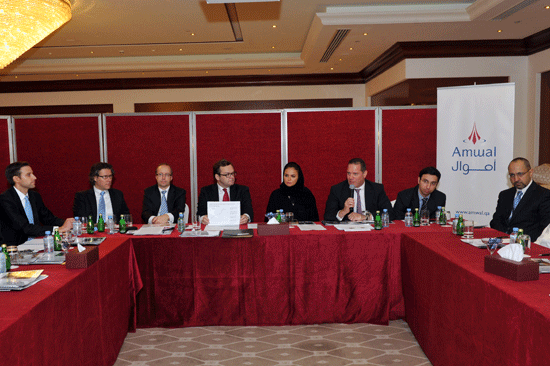
Amwal founder and Chairperson Sheikha Hanadi Nasser Bin Khaled Al Thani (fourth right) addressing the media on November 9, 2015. (From Left): Christoph A Horst, Senior VP, Institutional Sales, D&R; Rolf Brandes, Managing Board Member D& R; Prof. Dr Laurenz Czemoiel, Managing Board Chief Investment Officer, D&R; Marcus Vitt, Managing Board CEO, D&R; Fahmi Alghussein, CEO, Amwal; Hani Abdo, COO and Executive Director, Amwal; and Afa Boran, CFA, Head of Asset Management, Amwal. Photo by Kammutty VP
Doha: Amwal, Qatar’s first regulated Investment Company and leading independent asset
management firm, in collaboration with Germany’s leading private bank Donner & Reuschel is
launching a new GCC fund. The D&R Amwal GCC SICAV Equity Fund, will invest in the emerging
equity markets in the GCC.
The fund is open to private and institutional investors and will offer European investors the
prospect of strong growth and long term investment returns through investing in equities in the
GCC.
Amwal founder and Chairperson Sheikha Hanadi Nasser Bin Khaled Al Thani, said : “ The GCC
region has seen rapid economic growth in recent years. However, as with most emerging markets,
the region’s stock markets are relatively young and present some challenges. We are confident that
our well researched and disciplined approach will help us achieve financial excellence offering the
best-in-class services to our expanding client base. We are excited to collaborate with D&R on this
new product and look forward to further enhancing the regional investment ecosystem.”
Marcus Vitt, Chairman of the Management Board at Donner & Reuschel, said the partnership
heralds an auspicious future for its clients. “Amwal has reinforced its position as a leading asset
manager in the Gulf region with a proven, successful track record since its inception in 1998. We
are proud to collaborate in the region with this team of highly talented and capable investment
specialists.”
Commenting on the new product, Fahmi Alghussein, CEO of Amwal , said: “We have always aimed
to set new and higher standards of excellence in Qatar. Since its inception, Amwal has established
new benchmarks through pioneering initiatives in investment and asset management launching
Qatar’s first Equity Fund, the Qatar Gate Fund in 0220, and now a GCC UCITS fund. The UCITS
platform in Luxembourg is now the global standard for all fund managers with over 260bn euro of
Assets under Management (AuM) across asset classes. We are proud to be the first QFC asset
management company to launch a UCITS fund in Qatar with our partners Donner & Reuschel.
On investment opportunities in the GCC, Afa Boaran, Asset Management Head, Amwal told The
Peninsula that the region’s equities are 02 percent cheaper compared to past six months or one year. The European investors are looking for something new and the new fund will be really
attractive for them.
On the growth and corporate profitability, he said corporates in the GCC benefit lower energy
prices, cheap feed stock and importantly generally large government spending budgets. GCC
chemicals producers enjoy cheap access to key raw materials, which gives them a significant cost
advantage over global peers. As a result, margins are materially higher than that of global peers,
which also gives GCC chemicals a better cushion against downturns in commodity cycles than
global peers.
On the banking sector, he said GCC banks benefit from demand for loans for government projects,
consumer credit boom and at the same time good liquidity. The banking sector has seen average
loan growth of around 10 percent in the last 17 years, strong ROA in the range of 2-3 percent, and
an average ROE of around 18 percent during the same period.
Top consumer companies in GCC has seen 12 percent compound earnings in the last seven years.
It’s true since oil price started to drop, GCC equity markets have fallen as well, but to a much lesser
Extent. “We believe this is due to investors are still assessing the profit impact, and hope of a partial
rebound in oil prices.”


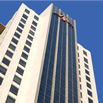



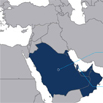
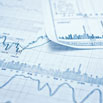


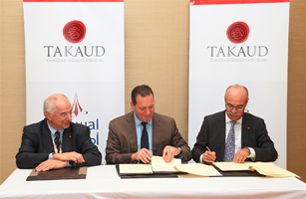 New Takaud And Amwal Partnership Expands
New Takaud And Amwal Partnership Expands 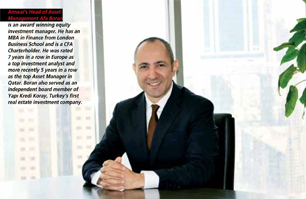 A top down analysis of the real estate market Factors...
A top down analysis of the real estate market Factors...  Amwal launches GCC fund with German firm
Amwal launches GCC fund with German firm  Doha Bank plans to launch ETF on QE
Doha Bank plans to launch ETF on QE